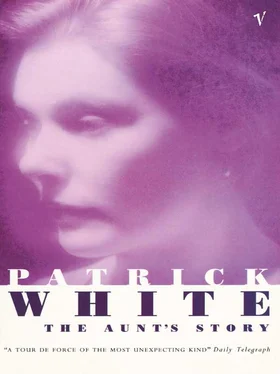Theodora had not been. She very much doubted whether she would go. Because, in thinking, she had become obsessed with Moraïtis, his words, his hands. It is not necessary to see things, said Moraïtis, if you know. It is like this, she said. And yet, for the pure abstract pleasure of knowing, there was a price paid. She remembered the Man who was Given his Dinner, the moment on the bridge, which was the same pure abstraction of knowing. But the exaltation was cold without the touch of hands, the breathing and stirring and waking of the tree in the snow.
Anyway, Theodora Goodman did not go to any one of the Moraïtis recitals. She waited, rather, to hear that they had passed, and that Moraïtis, whom she would not see, had gone. And like this, they were over. On the walls and hoardings the bills were already covered over by other wonders. She breathed. She felt exhausted, thin, after a long summer. Only Moraïtis did not go. He would remain, the papers wrote, for one more concert, as a guest artist, he would play the Such-and-Such Concerto.
Then, if that is how it is to be, decided Theodora Goodman.
‘Enjoy yourself,’ Mrs Goodman said, as if she were half afraid she might.
She remembered as a consolation that Fanny had been the musical one, whereas Theodora had often played an angular music that did not exist. Her thin, dark, struggling arms had filled Mrs Goodman with distaste.
At the concert, as at all concerts, everyone was rounded and well fed. Music filled out the lines and emphasized banality. It is not possible to listen to music without the body becoming a hump on a chair. Over the hall a great grey dumb organ hung and brooded, as it had over other similarly irrelevant occasions, of civic pomposity, or the paper folly of charity balls. Now an orchestra, playing an overture by a Russian, made the dust dance dimly on the organ’s face, stirred the dinners in stomachs on the chairs. Some of the chairs were still empty, the chairs of smarter people, who ate longer, later dinners, and who would arrive only in time for the name of Moraïtis.
Theodora Goodman sat close, but to one side, in such a position that she was an oblique assistant to the strings. But she could not listen much. She heard the slabs of music piled one upon the other. She waited for the heap to be made, till Moraïtis should come. And her bones were sick and brittle, her hands burned. Good-bye, Miss Goodman, Moraïtis had said, I shall remember we are compatriots. Taking it for granted there would be no reunion, but why, unless Moraïtis accepted the distances, in which case there was no need. Now she wondered about him, in the wilderness of preliminary music, where he stood, perhaps in a small brown, bare room with two large gilt mirrors of an unfashionable century, in which he stared at his blue chin, working together his muscular hands. Through the rain of distant music, in a comb of corridors, Moraïtis stood in the perspective of the brown room, which tried to contain him, but which failed, defeating its own purpose in reflections of reflections, endlessly. Just as Moraïtis himself defeated his own inadequate face, overflowing through the cavities, or thought eludes the skeleton of words. Theodora saw the reflection of Moraïtis suddenly pick up a tumbler of water from a tin tray, and all the reflections swallowed. Then the reflections gave a quick glance at their teeth. Each of these solemn acts was repeated by the mirror, and isolated, and magnified, without detracting from its privacy. Because Moraïtis was protected by some detachment of unconcern. He accepted the isolation. He retied his bow. The eyelids were contemptuous on the eyes.
At that moment people had begun to clap, and she knew that he had come. He stepped out on to the stage in the isolation which he had brought with him from the mirrors. His bald head shone like a bone. Moraïtis sat down and put his ’cello between his legs, and now you could see that his isolation fitted him closely, aptly, like an armour, which would protect in him some moments that were too delicate to expose. Theodora watched. He saw and did not see. Now she was closer. It was no longer a matter of intervening heads and chairs. She was herself the first few harsh notes that he struck out of his instrument against the tuning violins.
Then the silence crackled. The concerto had begun. The violins made a suave forest through which Moraïtis stepped. The passage of the ’cello was difficult at first, struggling to achieve its own existence in spite of the pressure of the blander violins. Moraïtis sat upright. He was prim. He was pure. I am a peasant, he said. And he saw with the purity of primitive vision, whether the bones of the hills or the shape of a cup. Now the music that he played was full of touching, simple shapes, but because of their simplicity and their purity they bordered on the dark and tragic, and were threatened with destruction by the violins. But Moraïtis closed his eyes as if he did not see, as if his faith would not allow. He believed in the integrity of his first tentative, now more constant, theme. And Theodora, inside her, was torn by his threatened innocence, by all she knew there was to come. She watched him take the ’cello between his knees and wring from its body a more apparent, a thwarted, a passionate music, which had been thrust on him by the violins.
The ’cello rocked, she saw. She could read the music underneath his flesh. She was close. He could breathe into her mouth. He filled her mouth with long aching silences, between the deeper notes that reached down deep into her body. She felt the heavy eyelids on her eyes. The bones of her hands, folded like discreet fans on her dress, were no indication of exaltation or distress, as the music fought and struggled under a low roof, the air thick with cold ash, and sleep, and desolation.
But in the last movement Moraïtis rose again above the flesh. You were not untouched. There were moments of laceration, which made you dig your nails in your hands. The ’cello’s voice was one long barely subjugated cry under the savage lashes of the violins. But Moraïtis walked slowly into the open. He wore the expression of sleep and solitary mirrors. The sun was in his eyes, the sky had passed between his bones.
Theodora went as soon as it was over, out of the applause, into the trams. She walked some distance, the other side of the screeching trams, without seeing much. Her hollow body vibrated still with all she had experienced. Now it was as empty as hollow wood.
‘Did you spend an enjoyable evening?’ Mrs Goodman asked, glancing with apprehension over the covers of her book.
‘It was more than enjoyable,’ said Theodora, taking off her gloves.
Mrs Goodman would have said something hard and destructive, only she saw that Theodora was now strong, and for this reason she did not dare. Theodora was removed. She had the strength of absence, Mrs Goodman saw. This made her very strong. It was also rather immoral, the strange, withdrawn mood that one could not share. In her failure to find words Mrs Goodman’s old, soft-fed stomach grizzled and complained.
‘I am not feeling very well. I think I shall go to bed. It is something I have eaten.’
But the absence of Theodora persisted, and in the morning. Many mornings trumpeted across the bay their strong hibiscus notes. The mornings smelled of nasturtium, crushed by the bodies of lovers on a piece of wasteland at night. Theodora sat sometimes to remember the music she had heard. At these times she sat and looked at the piece of wasteland which was between their thin house and the bay. And the music which Moraïtis had played was more tactile than the hot words of lovers spoken on a wild nasturtium bed, the violins had arms. This thing which had happened between Moraïtis and herself she held close, like a woman holding her belly. She smiled. If I were an artist, she said, I would create something that would answer him. Or if I were meant to be a mother, it would soon smile in my face. But although she was neither of these, her contentment filled the morning, the heavy, round, golden morning, sounding its red hibiscus note. She had waited sometimes for something to happen. Now existence justified itself.
Читать дальше












